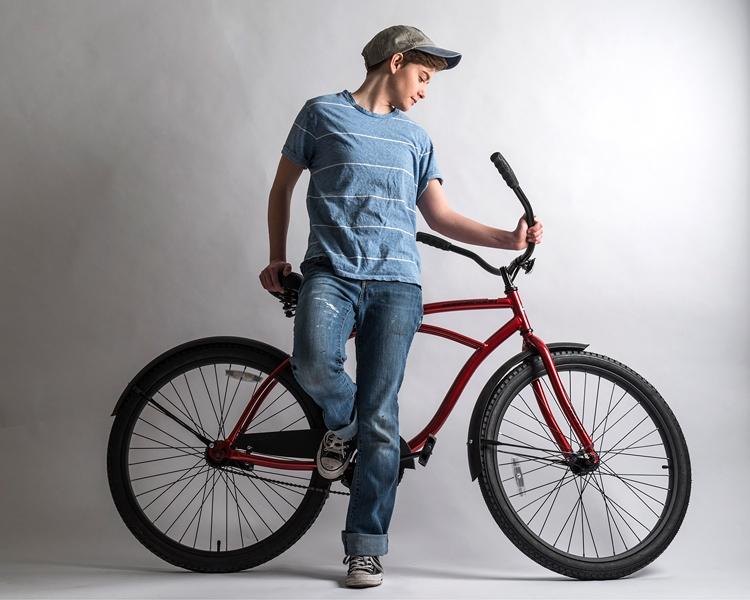CORRECTION: “Red Bike” was not produced in 2017, the play received a reading in that year.
“Hopes and dreams aren’t dead yet, they’re alive here,” an audience member said during the panel discussion held after “Red Bike’s” opening show. That phrase beautifully sums up many aspects of the play and its myriad of themes.
“So, it’s like this: you’re eleven years old, you live in a small town and the times are dark, as they say. But you have a bike, a bike you love, a bike that makes you dream about a world bigger than the one you live in,” Caridad Svich said in a synopsis on Pygmalion’s website. “One day, you take a ride through the outer edges of your town and something goes awry. Let’s call it an accident. Let’s say it causes you to see the world anew. Or maybe it just causes you to see the world for what it truly is.”
Superbly showcasing human resilience, morality, sadness, anxiety and hope through childlike storytelling and contemporary staging, “Red Bike” is a National New Play Network play written by Svich and read in 2017. It is currently showing at the Rose Wagner Performing Arts Center and is directed by Fran Pruyn.
Featuring only three actors, the story is told from the perspective of eleven year-old children. It utilizes the overly dramatic storytelling common to the age without the falsity of adults attempting to act like children. These children explore the darker aspects of what makes us human and realize that change is what they make of it — because a bike has no direction unless someone is steering and propelling it. So although much of the work focused on the sadness inherent in change and losing one’s customary way of life, it ends on a positive note.
“Red Bike” was more than just a positive message. It was a beautifully staged and crafted attempt to create an understanding of the progression of time, the importance of dreams and a commentary on the world around us. The stage was sparsely decorated with wheels, pedals, gears and tennis shoes hanging from wires suspended across the back of the stage. This beautiful piece looked like modern art and drew the eye across the stage, but wasn’t so obtrusive that it detracted from the actors. Small stools and boxes were scattered across the stage and were used to prop up the red bike front and center. Later these boxes and stools were used to create an abandoned silo, a living room, a diner and a variety of other things.
The actors used these props and their own storytelling abilities to inspire the audience’s imagination. Throughout the play, Sydney Shoell, Andrea Kile Peterson and Jesse Nepivoda (Ensemble) are never given names or specific roles. The use of ambiguous pronouns brings the audience into the story, allowing everyone to relate to the work in their own way. At the beginning, the use of “you” seems a little odd, but as the play progresses the story becomes all the more engaging because of it. Audience members can relate to the childhood memories Shoell, Peterson and Nepivoda are working to evoke — the desire to inspire envy, the excitement of a first taste of freedom and the limitless number of hopes and dreams, no matter how unrealistic. These three brought a sense of wonder and innocence to a performance discussing many serious themes. They managed to never seem like caricatures of children, but actual children. In order to do so, Peterson said she “captured [her] inner child and [had] fun with it” to create a more realistic experience for those watching the play.
An experience is the best way to describe witnessing this production. There wasn’t an intermission because the show itself isn’t very long compared to other plays. Scenes transitioned flawlessly through the use of lighting, percussion, creative use of props and Peterson’s trumpet, though the actors never stepped foot offstage after the play began. These transitions created a cohesive story about how integral one’s past is to who one is and will become, the anxiety we feel about politics and money and the importance of compassion through an easy-to-absorb medium: the eyes of a child.
Svich said, “I wanted the most vulnerable person in society to write it… Because they are our future, I want that voice to be at the center.”
Svich shows not only the child’s vulnerability, but our own vulnerability. She reminds us that as children we knew more than most adults thought we did, yet understood less than we thought we did. This duality keeps hopes and dreams alive in this play. Because there are unlimited possibilities of what a child can be and the change they can begin, there can always be hope for what comes next. “Red Bike’s” message is refreshingly relevant to the world we’re living in because the play takes the time to discuss the horrors of the world but is also refreshingly optimistic — it doesn’t leave you with a sense of loss or despair.
Overall, this was an amazingly engaging play full of dramatic yet realistic twists and turns that were often relatable and creative. I definitely recommend seeing “Red Bike.”
“Red Bike” began April 20 and will have showings on Thursdays, Fridays and Saturdays through May 5. Showtimes are 7:30 p.m. with additional matinees April 29 and May 5 at 2 p.m. at the Rose Wagner Performing Arts Center in the Leona Wagner Black Box Theatre. Tickets are $20, but those who bring in a bicycle to donate to the Bike Collective will get $5 off their ticket and be donating to a worthy cause. For more information or to buy tickets, check out http://pygmalionproductions.org/ourseason/red-bike/
@ladyofth3lak3


